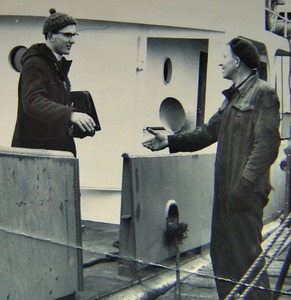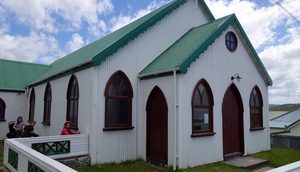CHARMAN, PAUL JOHN
b 1939 from England
minister at the Tabernacle, was born on 9 August 1939 the son of Charles Charman and Mary, née Thrift, a devout Christian couple in South London. He was the first of three children and soon took his place in the local church. A rebellious streak could already be seen during his teenage years when he played the organ for public worship wearing drainpipe trousers, white socks and thick-soled shoes. After a poor academic record at school and a short time working for a national bank, he was conscripted for national service in 1958, serving in East Africa and the Mediterranean when the 'wanderlust' took hold. In 1960, together with his fiancée Diane Newman, he attended Bible College in Glasgow and, after marriage in 1962, was ordained into Christian ministry at a church in Southampton.
In 1966 the Charmans found themselves searching an atlas for the Falkland Islands. They were subsequently accepted for ministry at the Tabernacle (United Free Church) arriving in April 1967 and completing a four year contract in 1971. Their ministry in the Islands, coming so soon after the long service of the much-loved Rev Dr Forrest McWHAN, was planned to be mainly one of consolidation. Within a month of arriving in Stanley they welcomed into their home the Revd Dr Arnoldo Canclini, visiting from Buenos Aires, a senior Baptist minister and world authority on Christian Missions in Patagonia; he was to become a lifelong friend.
Together with a strong band of workers from the church, the emphasis of the Charmans' ministry in Stanley included working amongst children and young people; the numbers attending the Curiosity Club, Town Hall 'twist sessions', youth home groups, and Sunday School proved a need for such work amongst the younger generation. Charman was involved in the Winter Show, the popular wool and handicrafts exhibition introduced by Lady Haskard; he also taught religious studies in Stanley schools. He occasionally found himself in hot water when challenging the established order of things - full representative democracy was only a glint in a few people's eyes in those days.
The joy of regularly visiting Camp families proved to be an important aspect of Charman's work; the MV Forrest, which he dedicated, together with RMS Darwin, the Beaver floatplanes and even the odd horse are remembered as enjoyable means of transport.
The Charmans arrived in Stanley with two daughters, Ruth (b1963) and Elizabeth (b1966), and left with an additional child, Stephen (b1970).
The stresses of Christian ministry in the Islands, with the inability to 'get away' from the work, took its toll and Charman did not return to Christian ministry for many years after returning to London in April 1971. However, the experience of church work in the Islands significantly changed his life: his beliefs and practices became more flexible and open and the experience of human nature that he gained in the Islands enriched his life and influenced his future work.
Since his time in the Falklands, Charman's work has included establishing a race relations project in the east end of London. He returned to education while in his 50s and gained a doctorate from Lancaster University (he always felt a bit inferior to his predecessor in 'the Tab'!). He returned to Christian ministry in an east London church in 1998 before retiring in 2004.
In 1982 he helped to establish the Penguin Project which successfully raised funds to enable him to return to the Islands immediately after the Conflict in order to minister to members of the Tabernacle who then were without a minister. At the invitation of the Tabernacle, the Charmans visited the Islands in 1992 for their centenary celebrations in Stanley and Goose Green. They also returned for a holiday in 2006, together with their friend Arnoldo Canclini.
For much of their married life Diane Charman taught in primary schools, mainly in London, as well as taking a full and important role in church life. They now spend their retirement in London where they enjoy life with their adult children and grandchildren in a multiethnic community. Their son Stephen is the Methodist chaplain at Lancaster University.
Comments
Revisions
July 2019 Additional photograph added

